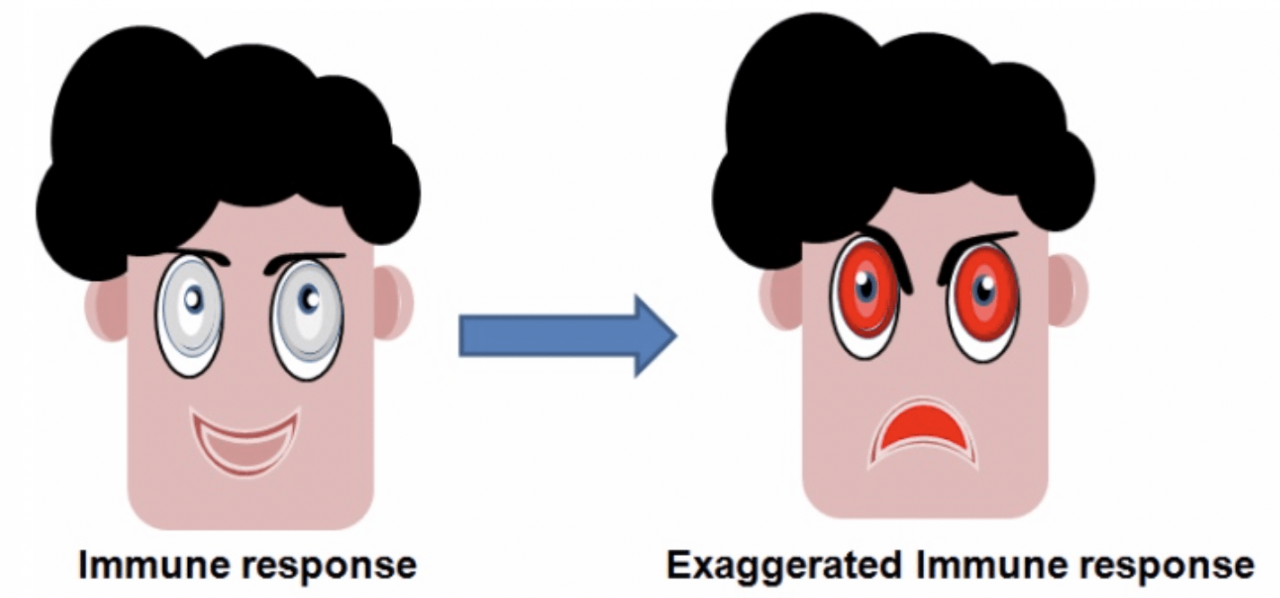An exaggerated response by the immune system – When the body’s defense system goes into overdrive, an exaggerated immune response can wreak havoc. This occurs when the immune system, normally responsible for protecting against infections, mistakenly attacks healthy tissues. From allergies to autoimmune diseases, this overreaction can lead to a range of conditions, highlighting the critical balance the immune system must maintain.
Delving into the causes, mechanisms, and consequences of an exaggerated immune response, this exploration unravels the complexities of our body’s defense system. By understanding the triggers, molecular players, and potential outcomes, we gain insights into managing and potentially preventing these immune system imbalances.
An Exaggerated Immune Response
When the immune system overreacts to a perceived threat, it can lead to an exaggerated immune response. This can cause tissue damage, organ dysfunction, and systemic inflammation.
Causes of Exaggerated Immune Responses, An exaggerated response by the immune system
Exaggerated immune responses can be triggered by various factors, including:
- Infections
- Allergies
- Autoimmune disorders
Mechanisms of Exaggerated Immune Responses
Exaggerated immune responses involve the activation of immune cells, such as macrophages and neutrophils, which release cytokines and chemokines. These chemical messengers recruit additional immune cells to the site of inflammation, leading to tissue damage.
Consequences of Exaggerated Immune Responses
Exaggerated immune responses can have severe consequences, including:
- Tissue damage
- Organ dysfunction
- Systemic inflammation
Management of Exaggerated Immune Responses
Managing exaggerated immune responses involves suppressing the immune system. This can be achieved through:
- Immunosuppressive therapies
- Anti-inflammatory medications
- Lifestyle modifications
Future Directions in Research on Exaggerated Immune Responses
Ongoing research focuses on understanding the mechanisms of exaggerated immune responses and developing new therapies. This includes:
- Investigating the role of specific cytokines and chemokines
- Developing targeted therapies to modulate immune responses
Last Word: An Exaggerated Response By The Immune System

An exaggerated immune response serves as a sobering reminder of the delicate balance within our bodies. As research continues to unravel the intricacies of this phenomenon, we move closer to developing targeted therapies and interventions. By harnessing a deeper understanding of the immune system’s complexities, we empower ourselves to navigate the challenges posed by these overreactions, paving the way for a healthier future.
FAQ Resource
What triggers an exaggerated immune response?
Infections, allergens, and autoimmune disorders can all disrupt the normal immune response, leading to an exaggerated reaction.
What are the consequences of an exaggerated immune response?
Tissue damage, organ dysfunction, and systemic inflammation can result from an overactive immune system.
How is an exaggerated immune response managed?
Immunosuppressive therapies, anti-inflammatory medications, and lifestyle modifications are common strategies for managing these conditions.